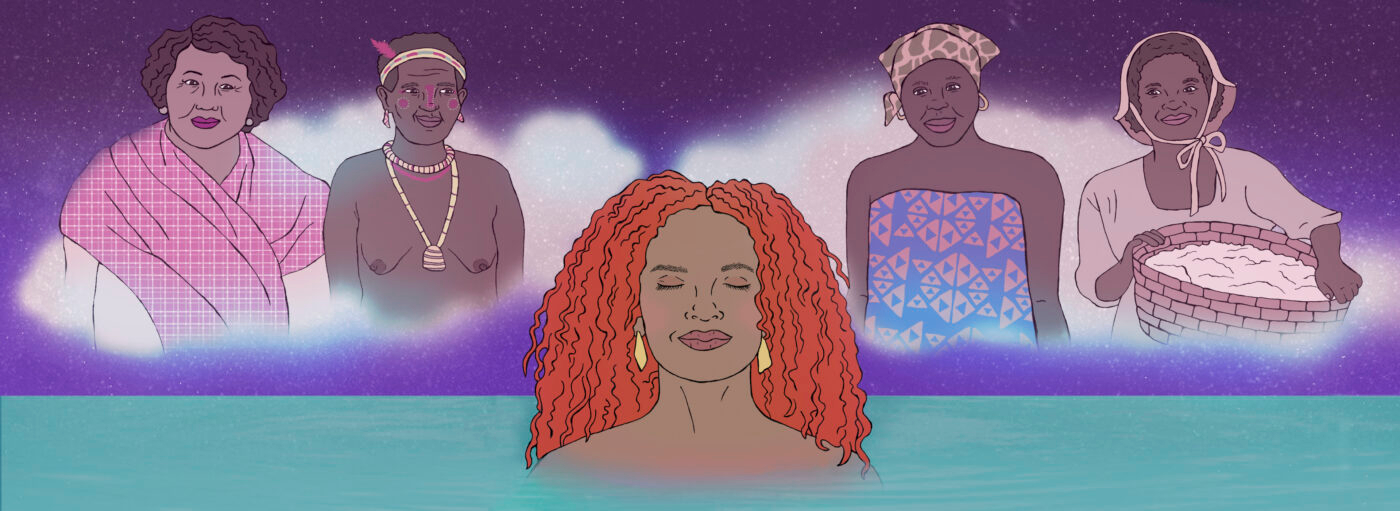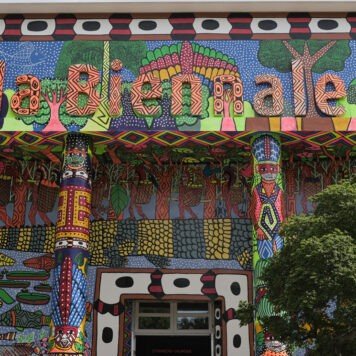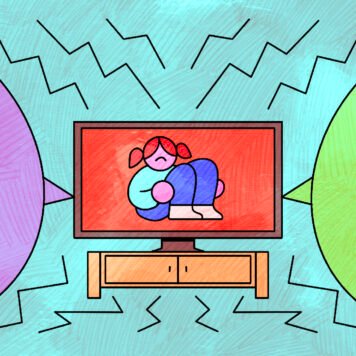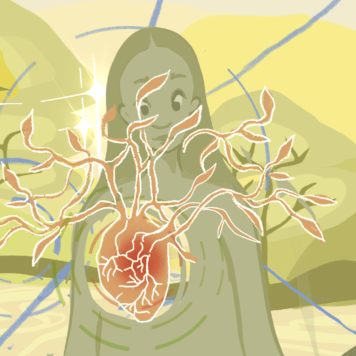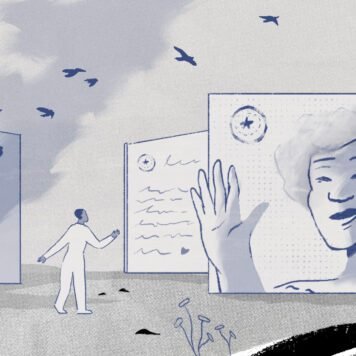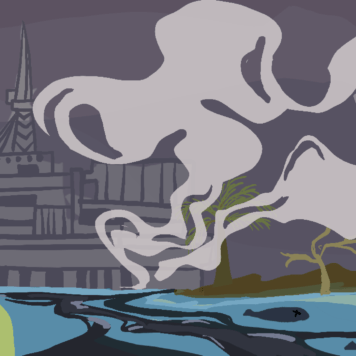Untangling the complexity of intergenerational trauma that we carry as people of the global majority is anything but a light hearted task. As someone who has experienced deep grief in the last couple of years over the loss of my father, his departure has unravelled many ancestral emotions within me.
It has pushed me to find Indigenous mentors and community, realising that it’s in these spaces that I am reconnecting with ancestral ways of coping with grief and anger. The comfort that this provided led me to question how long my ancestors had been waiting for someone like me to break through and reconnect with our knowledge about aligning our minds, body and spirit when we speak of wellness?
This is a question that has been swirling in my head and heart for some time now, and it’s no surprise to me that my ancestors keep providing answers by aligning my pathways with healers and dreamers like Dr. Jennifer Mullan. For Jennifer, a Black mixed-race Panamanian and Indigenous woman, the process of reconnecting with ancestral knowledge and healing intergenerational trauma is one of decolonisation.
Growing up, Jennifer increasingly noticed how the colonisation of her ancestors impacted her daily life. This was especially true when it came to witnessing the different forms that anger took amongst the people in her family and community.
As Jennifer embarked on her own healing journey through education, counselling, and teaching, Decolonizing Therapy came together. Decolonizing Therapy is a platform and collective that is focused on supporting BIPOC and LGBTQI+ people of the global majority to address mental health issues and shift the world’s understanding of therapy and counselling in a way that centres healing, liberation and decolonisation.
After speaking with Jennifer, I found myself reframing the ‘work’ of healing as an Indigenous woman and viewing it instead as a gift from my ancestors.
Decolonisation as an act of psychological and physical resistance
Jennifer believes that colonisation was, and continues to be, the act of kidnapping, removing, extracting, and taking without permission of land and peoples. These are acts of violence on our spirits: they take away our agency, and change our way of thinking to be more aligned with Western forms.
Such a definition sees colonisation as an action, perpetrating both psychological and physical forms of violence. It therefore requires the process of decolonisation to be an act of psychological and physical resistance.
Although turning to psychiatry, therapy and counselling as a solution to mental health issues is still rejected by many groups of people, such as those that feel it contradicts with their religious or moral beliefs, slowly some of the taboo is beginning to lift around seeking help from medical professionals..
Therapy is now becoming common enough that we now have apps on our phones that allow you to search for a therapist in your area as well as facilitating virtual therapy sessions.
However, therapy is still largely a practice that is dominated by Westernised structures, and doesn’t often centre the experiences of those living with colonial intergenerational trauma.
Jennifer goes on to describe decolonising therapy, or even further the decolonisation of our entire health system, as “soul shadow work,” which to her involves “looking at the things we wanted to avoid for a long time to get to the root of the pain.” This root being the displacement of Black and Indigenous people globally, not only from our land, but from our traditional forms of healing and living, outside of violent structures such as capitalism and patriarchy.
Healing our intergenerational rage
One of the key components of Jennifer’s practice is embracing and working through intergenerational anger. Through Decolonizing Therapy, Jennifer discusses how doing so can be a means to connect with our ancestors.
Jennifer tells me: “since rage is born in the face of trauma, marginalised Black, brown and Indigenous bodies are frequently on the front line of this burden.” Colonists have always benefitted from demonising the anger expressed by BIPOC through violent tropes in media, and racist, violent structures. For example, the trope of the “Angry Black Woman” or “Savage Indian” are just a few ways in which white supremacy has created shame for Black and Indigenous people to express their rage against colonisation.
Jennifer believes that our ancestral anger can be channelled and transformed into revolutionary practices that can lead us down a path for liberation. She explains that we can use that anger to question parts of life and systems around us that no longer serve us.
She poses the questions to me: “how is our life out of sync with your ancestors’ practices? How can we begin to deconstruct the anger we carry in our DNA, by living a life our ancestors were robbed of?”
Personally, I had never considered embracing my ancestor’s anger as part of my healing journey, but upon hearing Jennifer describe ancestral anger as both a story searching for a way to be told and an invitation to change our lifestyle, my perspective has changed.
This has particularly helped me in processing the generational anger that the women in my family have experienced. Most of their anger is a result of the economic, physical and emotional exploitation they had experienced as women living in rural Mexico. But more importantly, as racialised women who were impacted by the colonisation of our people’s ways of life with the imposition of a capitalist, patriarchal, racist and Catholic society.
This to me is where decolonising therapy moves beyond theory into praxis. It’s helped me believe that we can actively choose to live a life that centres the abolition of colonial structures, in order to rebuild systems of care and Indigenous frameworks.
Jennifer describes the decolonial part of therapy as “the part where we go to the root and go back to our ancestry and deal with the soul wound… abolition is looking at [and removing] the structures that no longer work.”
Subscribe to shado's weekly newsletter
Exclusive event news, job and creative opportunities, first access to tickets and – just in case you missed them – our picks of the week, from inside shado and out.

For myself, that looks like honouring my grandmothers, my mother and the many generations of women that came before them by having a life filled with less anger and more connection to our Indigenous ways of life that centre matriarchal relationships.
It also means reclaiming my time and voice, and actively pushing back when asked to overextend myself in terms of emotional and physical labour. Sometimes setting these boundaries and choosing my own pleasure and joy can be expressed through literal anger. But nonetheless, that anger is valid because it’s driving me to live a life that ensures my survival and preservation as an Indigenous woman.
Healing from displacement
During our conversation, Jennifer speaks about decolonising therapy as an act of healing the root cause of trauma and pain: separation. She defines it as “separation from our land, our ancestry, our community, and our innate joy.”
In my own journey of processing the recent passing of my father, I have leaned into reconnecting with the land and P’urhepecha community as a way to process this grief.
After telling Jennifer about this, she mentions how the “emotional decolonial process” we must undertake goes alongside taking land back for Indigenous people globally in order to heal the colonial trauma and repression that has been experienced by BIPOC.
Through our conversation, I realise that decolonising therapy can also provide a means to reconnect with our relationship to the Earth, both as a form of reclamation and also as a way of slowing down to pay closer attention to our surroundings and the messages the ancestors have to say to us through the land.
As Jennifer says, “anytime you pull a cord, a vein, a root, of colonial harm, or trauma, we can also find something that was passed down that is beautiful.”
Beauty in our healing journey can come from our interactions with water, soil, growing food, and so many other ways that the Earth has the ability to show us how cared for we are by those that came before us.
What stays with me after our conversation is Jennifer’s call for us to embark on a journey of self-exploration, knowing that we have the power to transform and heal not only ourselves, but all the ecosystems around us.
Now is the time for a collective movement by people of the global majority to heal our deepest colonial wounds in order to build a different world. In the words of Jennifer, “We need more people who commit to an ongoing process of emotional decolonisation. Who are prepared to help the world dig deep and access true liberation, healing, and joy.”
What can you do?
Connect with Decolonizing Therapy:
- Decolonizing Therapy offers a variety of courses to unpack “the oppressive legacies of modern mental health practices and returning to the root”. Topics range from processing through rage, grief, to honouring the sacredness of setting boundaries. You can learn more about the courses and sign up here
- In addition, Jennifer offers speaking engagement services and opportunities for short and long-term consulting for organisations; agencies; group therapy practices; and more. You can look through her offerings and reach out for a consultation, using this link: Services.
- Other resources that Jennifer offers include her “Recommended Reading’s For Unlearning” list, her Resource List, and content shared on Decolonizing Therapy’s Instagram account.
- If you would like to give monetary support to Decolonizing Therapy, which goes towards free coaching sessions for the community, you can donate here.
- Read Jennifer’s book, Decolonizing Therapy: Oppression, Historical Trauma and Politicizing Your Practice
Read more articles by Samara:


